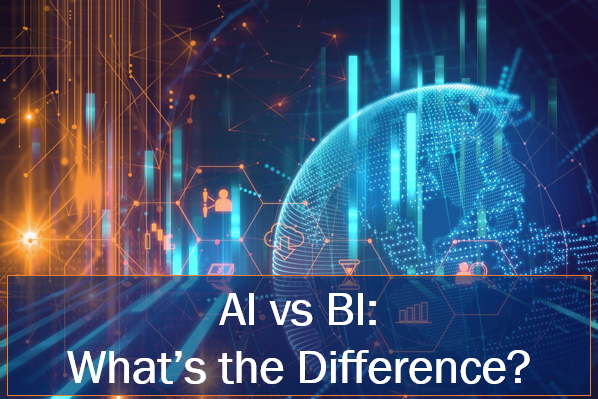

January 11, 2019 - by Anish Purohit
In spite of all the excitement around smart, data-driven decision-making, Business Intelligence (BI) and Artificial Intelligence (AI) are often thought to be synonymous with each other. The AI vs BI debate is a long-standing one. And while both aid businesses in critical decision-making, there are crucial differences that separate the two. The intelligence in AI refers to human-like computer intelligence, and the intelligence in BI refers to intelligent decision-making. Let’s take a closer look at the differences between BI and AI, and understand how they can together drive modern business enablement.

AI, put simply, is a way to make a computer system think intelligently like humans. It learns from past experiences, and several problem-solving measures and mimics human intuitions and judgment, post-training, and iterative experiments.
BI is a technology used to gather, store, access, and analyze data to help business users in making better decisions. BI turns data into meaningful insights – in the form of reports and dashboards – and enables organizations to make better data-driven decisions. It helps capitalize and maximize available historical data.
|
Business Intelligence |
Artificial Intelligence |
|
| What is it? | Traditional analytics that make analyzing data easier but leaves decision-making in the hand of humans | Advanced analytics that enables computers to make critical business decisions themselves |
| Goal | To streamline the process of collecting and analyzing data and provide businesses with useful information and analysis to aid decision-making | To mimic human intelligence, behavior, and thought process and help businesses to make rational decisions |
| Why and when is it used? | Develops insights based on data already gathered; it is used to answer what has happened in the past | Analyzes large quantities of big data; it is used to answer what will happen in the future |
| How does it work? | It works on the principles of statistical analysis | It uses sophisticated machine learning and deep learning algorithms |
| How does it help businesses? | It analyzes past data and enables businesses to make better data-driven decisions to improve business processes, customer service, and employee satisfaction | It creates human-like intelligence in machines and enables businesses to forecast and predict customer demand, competitor standing, and market changes |
| Hierarchy | BI comes first in the hierarchy of analytics | AI comes after BI in the hierarchy of analytics |
| Application | Majorly used in reporting, data mining, data warehousing, and highlights key matrices and visuals out of historic data in the form of modern, intuitive dashboards | Majorly used for predictive analytics, gaming, forecasting, natural language processing, robotics, image recognition, and self-driving cars |
| Goal and final outcome | It starts with gathering and analyzing data points from various data sources, and ends with visual reports and dashboards | It starts by training computer systems to think and work like humans, and ends with predictive insights about the future |
| Usefulness | BI is helpful in descriptive analytics | AI is a key player in prescriptive analytics |
Although AI and BI have a lot to offer individually, when used together, they can drive even better results. BI and AI combine to create a perfect recipe that delivers analytical solutions in any business situation. Using BI, analysis on historical data can be done; the resulting dashboards can help determine the pattern in data which can be utilized at its best by AI to predict future outcomes and foresight.
Earlier, standalone BI applications were capable of analyzing historical data; however, when combined with AI, it can suggest what will happen in the future, considering the patterns of historical data. Moreover, data management and analysis done in BI gives a lot of handy resources for AI applications; by integrating and utilizing those insights, businesses can build predictive machine learning models and attain quick and more accurate results.
AI-enabled BI can delve deeper into unknown problems, and find critical insights in previously unexamined data. By leveraging the benefits of natural language generation capabilities, it can make businesses understand what these insights mean and how they should act on them. When used together, they can automatically review past data and provide alerts to new and interesting features. AI-powered BI platforms can free up a lot of time for analysts, and enable them to move to more effective data analytics projects. By combining BI with the best capabilities of AI, businesses will get an opportunity to analyze and derive actionable insights more efficiently.
The pace at which BI and AI are growing, individually, in their respective domains is unimaginable. However, what most businesses fail to realize is the combined benefits of AI and BI that can help them in creating entirely new business models. While BI is greatly useful in analyzing historic data – through the use of analytical models, AI makes predicting future outcomes a breeze – through the use of human-like problem-solving skills, learning, and judgment.
Having said that, it is not a battle between BI and AI, rather how these two technologies can be the perfect match for business excellence. All that is required is for the hype surrounding AI and BI to start wearing off, for the differences to seem trivial, and the opportunity more apparent.
Learn more about combining BI and AI capabilities into your business processes for optimal results. Or, if you would like to speak with an expert, contact us today.
